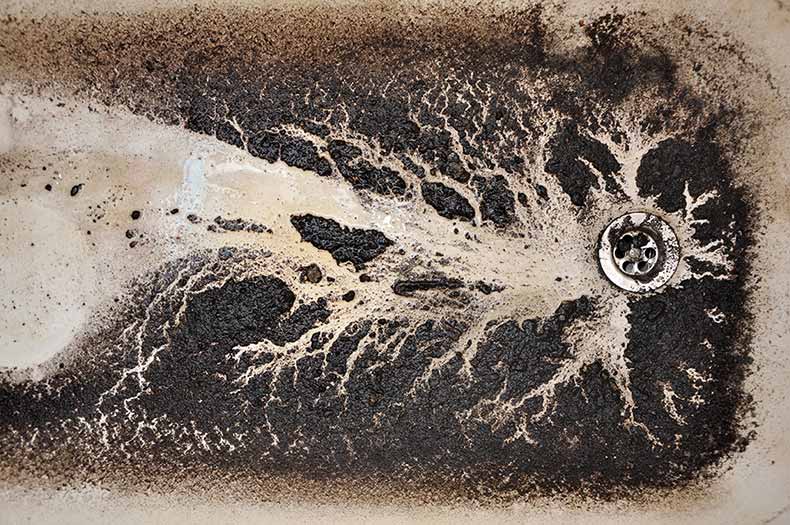Our Definitive Explanation: Waste Coming Up Through the Bathtub
Our Definitive Explanation: Waste Coming Up Through the Bathtub
Blog Article
The writer is making several great points on Water Coming up Bathtub Drain as a whole in this content following next.

Sewer backup in the bath tub can be a distressing and unhygienic trouble for any home owner. Not just is it troublesome, yet it additionally presents serious health and wellness threats and suggests underlying issues with the plumbing system. Understanding why sewer is coming up through the bath tub is vital for taking appropriate activity to address the problem properly.
Introduction to the Concern
Recognizing the Problem
When sewer starts backing up into the tub, it's a clear indicator of a problem with the drain system. The wastewater that should be streaming far from your home is instead finding its way back into your living space, which can result in considerable damage and health hazards.
Potential Causes
Several variables can contribute to sewage back-up in the bath tub. From blockages in the drain line to concerns with the plumbing framework, recognizing the root cause is important for finding a service.
Usual Factors for Sewer Backup
Clogs in the Sewer Line
One of the most typical root causes of sewer backup is an obstruction in the sewer line. This can happen because of the buildup of particles, grease, or foreign items in the pipes, stopping appropriate circulation and causing sewage to back up into your tub.
Tree Root Invasion
Tree roots looking for dampness and nutrients can penetrate sewage system lines via small cracks or joints. In time, these roots can expand and broaden, triggering significant damage to the pipes and causing sewer backup problems.
Aging Facilities
Older homes may have obsoleted plumbing systems that are much more susceptible to deterioration, fractures, and degeneration. As pipes age, they come to be much more prone to leaks and obstructions, enhancing the likelihood of sewage backup incidents.
Heavy Rainfall or Flooding
During periods of heavy rainfall or flooding, the sewer system may end up being overloaded with excess water, triggering backups and overflows. This can cause sewer supporting into bathtubs and various other components inside the home.
Health And Wellness Dangers Related To Sewage Backup
Contamination of Supply Of Water
Sewer backup can infect the water supply in your house, posturing a severe health and wellness threat to you and your household. Direct exposure to infected water can lead to intestinal issues, skin infections, and other illnesses.
Spread of Illness
Sewage has unsafe bacteria, viruses, and parasites that can create a range of illness, including hepatitis, cholera, and gastroenteritis. Entering contact with sewage or polluted surfaces places you in jeopardy of infection.
Mold and mildew Development
Wetness from sewage back-up can produce ideal problems for mold and mildew growth in your house. Mold and mildew spores can worsen breathing problems and trigger allergic reactions in delicate people, making punctual cleaning important.
Indications of Sewage Back-up
Foul Odors
Undesirable smells originating from drains pipes or components, especially in the restroom, may suggest sewage back-up problems. These smells are frequently strong and persistent, signaling an issue that needs instant interest.
Slow Draining Fixtures
Tubs, sinks, and bathrooms that drain pipes slowly or otherwise in all could be experiencing sewer back-up. If multiple components are influenced concurrently, it's likely that the issue stems from an usual point, such as the major drain line.
Gurgling Sounds
Odd gurgling or bubbling noises originating from drains pipes when water is running somewhere else in your home are a measure of air caught in the plumbing system. This air build-up can result from sewage back-up and need to be checked out immediately.
Immediate Actions to Take
Turning Off Water
In case of sewage back-up, it's necessary to shut off the water supply to prevent more contamination and damage. Situate the major water shutoff valve in your house and closed it off up until the problem can be settled.
Getting In Touch With an Expert Plumber
Managing sewage back-up is not a DIY job. Contact a qualified plumber with experience in handling sewage-related problems to evaluate the scenario and do required repair work or cleanups.
Staying Clear Of Contact with Contaminated Water
Up until the sewage back-up is fixed, avoid contact with polluted water to prevent the spread of bacteria and virus. Wear safety equipment if you need to remain in the damaged area and wash your hands extensively later.
Preventive Measures
Routine Maintenance of Sewer Lines
Arrange routine examinations and maintenance of your sewer lines to determine and attend to potential concerns prior to they escalate into significant issues. This can include cleaning out debris, checking for tree root breach, and repairing any type of damaged pipes.
Mounting Bayou Valves
Take into consideration setting up bayou shutoffs in your plumbing system to prevent sewage from flowing back right into your home throughout durations of heavy rainfall or flooding. These valves instantly close when water starts backing up, securing your residential property from contamination.
Correct Disposal of Family Waste
Stay clear of flushing anything apart from bathroom tissue and human waste down the commode to avoid clogs and blockages in the sewer line. Dispose of oil, oil, and other house chemicals properly to lessen the risk of plumbing problems.
Tidying up After Sewage Back-up
Disinfection Procedures
Extensively decontaminate and sanitize affected areas after sewage back-up to get rid of dangerous germs and protect against mold development. Use proper cleansing products and protective equipment to guarantee risk-free and efficient clean-up.
Repair of Influenced Areas
Repair any kind of damages to flooring, walls, or components caused by sewage back-up. Relying on the extent of the damages, you may require to replace carpeting, drywall, or other materials to restore your home to its pre-loss problem.
Why Is Water Backing Up in My Bathtub When I Flush My Toilet?
What to do about a sewer line clog
First, don’t bother with plunging. No amount of plunging will dislodge the clog in a sewer line. The clog is too far away. Plungers are for clogs in the toilet itself, not the sewer line. Plus, the most likely causes of a sewer clog are:
Tree roots Flushed toys or feminine products Grease buildup Those items don’t move easily. And in the case of tree roots, the roots need to be cut out of the pipe and the pipe will need to be repaired.
You’ll need a closet auger. A closet auger is a type of plumber’s snake with a protective cover to keep from scratching the delicate porcelain toilet. If the clog is further down, you may need to remove the toilet or use one of your cleanouts to get to the clog.
We also recommend doing a video inspection of the drain to ensure that the cause of the clog has been completely removed. Otherwise, you could have the same problem again in a few days or weeks.
https://mspplumbingheatingair.com/blog/why-is-water-backing-up-in-my-bathtub-when-i-flush-my-toilet

I was made aware of that report on Why is Sewage Backing Up Into My Bathtub? through an associate on a different blog. Sharing is nice. Helping others is fun. I am grateful for being here. Come back soon.
Get A Free Estimate
Report this page